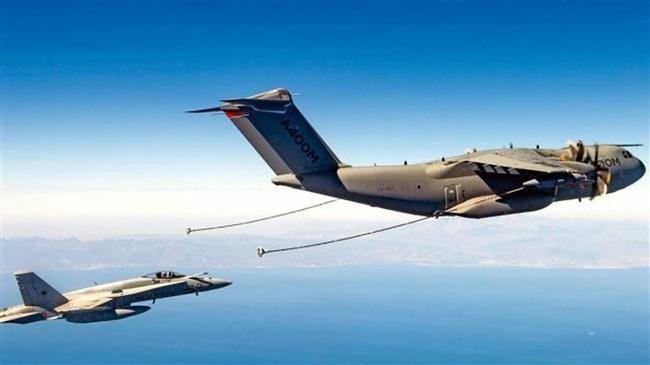Great Satan US allegedly suspends refueling Saudi jets in deadly bombing campaign on Yemen


The US has stopped providing mid-air refueling for Saudi warplanes in their deadly bombing campaign against Yemen amid mounting criticism of Washington’s complicity in war crimes in the impoverished state.
Reports said on Saturday that Saudi Arabia and the US had agreed on the suspension of refueling mission.
The official Saudi Press Agency (SPA) reported on Friday that Riyadh had itself demanded to stop inflight refueling services by the US military for its warplanes after “consultation” with the US.
“Recently the kingdom and the coalition has increased its capability to independently conduct inflight refueling in Yemen. As a result, in consultation with the United States, the coalition has requested cessation of support for it’s operations in Yemen,” the SPA said.
It also stressed that Saudi Arabia hoped upcoming UN-sponsored talks “in a third country” would help end the war on Yemen.
Meanwhile, US Defense Secretary Jim Mattis confirmed that the decision to stop refueling was taken in consultation with the US government, claiming that Washington would continue to work with the Saudi-led coalition to minimize civilian casualties and expand humanitarian efforts in Yemen.
“We support the decision by the kingdom of Saudi Arabia,” he said.
The Washington Post first reported the decision by the administration of US President Donald Trump to no longer refuel Saudi aircraft amid growing criticism of the regime’s actions in the wake of journalist Jamal Khashoggi’s murder.
On a related front, US Representative Ro Khanna (D-Calif.), an advocate of barring US military support to the Saudi-led coalition waging a war on Yemen, has introduced a measure in the House to ensure the Trump administration follows through on its decision.
Khanna told The Intercept that he was “cautiously optimistic” about the news of refueling suspension.
“This is a major change. It could avert a humanitarian crisis,” he said. “From everything that I’ve understood, from activists on the ground, from people who are briefed on policy, the war could not continue without the assistance of US refueling.”
The US military has been refueling about 20 percent of all Saudi aircraft that conduct airstikes on Yemen.
Senator Bernie Sanders (I-VT) welcomed the decision, saying he would press for the passage of a resolution that would call on Trump to withdraw from the war in Yemen.
“I’m glad that the Trump administration is ending US refueling of Saudi aircraft in Yemen’s devastating war… US participation in this conflict is unauthorized and unconstitutional and must end completely,” he said in a statement.
Additionally, Senator Chris Murphy (D-CT) emphasized that the Trump administration should cut off all forms of support for the Saudi-led coalition, not just refueling.
“Why are we still helping the Saudis with targeting? Why are we still selling them the bombs at a discount?” he asked. “Now that it’s no longer a secret that the war in Yemen is a national security and humanitarian nightmare, we need to get all the way out.”
However, several US officials said the end to refueling would not stop American training and military assistance for the Saudi aggression against Yemen.
In January 2016, Saudi Arabia said the US and UK military advisers were in the command and control center for strikes on Yemen and had access to lists of targets.
Saudi Arabia says that the US and UK military advisers are in “command center” with Riyadh in its war against Yemen.
The brutal war was launched in March 2015 in an attempt to reinstall Yemen’s former Riyadh-allied regime and crush the Houthi Ansarullah movement, which has been running state affairs in the absence of an effective government.
Back in June, the Saudi-led coalition launched an offensive against the port city of Hudaydah despite international warnings that it would compound Yemen’s humanitarian crisis.
The Western-backed imposed war on Yemen, coupled with a naval blockade, has destroyed the country’s infrastructure and led to famine as well as a cholera outbreak.
So far, the aggressors have been unable to penetrate the defenses of the Yemeni nation and Houthi fighters.








